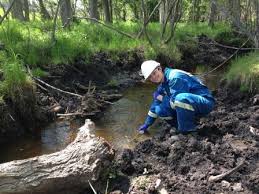Egypt's Wastewater Discharge Standards: A Critical Assessment Wastewater discharge standards in Egypt play a crucial role in ensuring the protection environmental testing services of public health and the environment. With limited freshwater resources and increasing population and industrial activities, the management and regulation of wastewater discharge are of great importance. In this paper, we aim to critically assess the current wastewater discharge standards in Egypt and their effectiveness in tackling the challenges posed by increasing wastewater generation. We will explore the existing regulations, their enforcement, and their implications for environmental sustainability and public health in Egypt.
Egypt's Wastewater Discharge Standards: A Critical Assessment is a research paper that evaluates the current wastewater discharge standards in Egypt. It provides an analysis of the effectiveness of these standards in protecting the top environmental consulting firms environment and public health. The paper also examines the challenges and limitations in enforcing these standards and suggests potential improvements. The assessment draws on scientific data, regulatory frameworks, and case studies to provide a comprehensive overview of the state of wastewater discharge in Egypt.
The Importance of Wastewater Discharge Standards in Egypt

The importance of wastewater discharge environmental management consultants standards in Egypt lies in the protection of public health, the environment, and the sustainability of water resources. By enforcing the standards, the government can ensure that wastewater is treated adequately before being released into water bodies, preventing the spread of waterborne diseases and contamination of drinking water sources. Additionally, adhering to discharge standards helps to minimize the impact of wastewater on aquatic ecosystems and agricultural lands, promoting long-term environmental health. Compliance with these regulations is crucial for Egypt to meet its water management goals and maintain the quality of its water resources.
Challenges and Solutions for Wastewater Discharge in Egypt

One of the major challenges for wastewater discharge in Egypt is the high levels of pollution and contamination in the water. This can be attributed to the discharge of untreated or poorly treated sewage and industrial effluents into water bodies, causing harm to the environment and public health. Furthermore, the limited infrastructure for wastewater treatment contributes to the problem. One potential solution to address this issue is to invest in and improve the wastewater treatment infrastructure in Egypt. This could involve upgrading existing treatment plants, constructing new facilities, and implementing advanced treatment technologies to ensure that wastewater is properly treated before being discharged. Additionally, enforcing regulations and implementing strict monitoring measures can help to reduce the amount of pollution entering water bodies. Another solution is to promote water reuse and recycling. By treating wastewater to a high standard, it can be utilized for agricultural irrigation, industrial processes, and other non-potable purposes, reducing the strain on freshwater resources and minimizing environmental pollution. This approach can also contribute to sustainable water management in Egypt. Furthermore, public awareness and education campaigns can play a crucial role in changing attitudes and behaviors towards wastewater management. By raising awareness about the importance of proper wastewater treatment and the potential consequences of pollution, communities can become more proactive in protecting water resources and the environment. Overall, addressing the challenges of wastewater discharge in Egypt requires a combination of technological, regulatory, and behavioral interventions to ensure the sustainable and responsible management of wastewater.
Understanding the Legal Framework for Wastewater Discharge in Egypt

Understanding the legal framework for wastewater discharge in Egypt is crucial for businesses and industries operating in the country. The Egyptian government has established laws and regulations governing the discharge of wastewater to protect public health and the environment. These regulations outline the permissible limits for various pollutants in wastewater and require businesses to obtain permits for discharge. The main legal framework for wastewater discharge in Egypt is the Egyptian Environmental Law No. 4 of 1994 and its executive regulations. The law sets out the requirements for obtaining discharge permits, monitoring and reporting obligations, and penalties for non-compliance. Additionally, regulations such as the Egyptian Standards for Wastewater Discharge specify the permissible limits for pollutants in wastewater. Businesses operating in Egypt need to be aware of these legal requirements and ensure that their wastewater discharge complies with the set regulations. Non-compliance can result in fines, closure of operations, or other legal consequences. Therefore, understanding and adhering to the legal framework for wastewater discharge is essential for businesses to operate legally and sustainably in Egypt.
The Role of Technology in Meeting Wastewater Discharge Standards in Egypt

The role of technology in meeting wastewater discharge standards in Egypt is critical in ensuring that the country's waterways are protected from harmful pollutants. Advances in technology have allowed for the development of more efficient wastewater treatment processes, including advanced oxidation, membrane filtration, and biological treatment methods. These technologies enable wastewater treatment plants to remove a wider range of contaminants from industrial and municipal wastewater, ensuring that the treated effluent meets the strict discharge standards set by the Egyptian government. Additionally, advancements in monitoring and control systems allow for real-time oversight of treatment processes, ensuring that effluent quality remains compliant with regulations. Furthermore, technology plays a crucial role in the maintenance and operation of wastewater treatment facilities, helping to optimize processes, minimize energy consumption, and reduce overall operational costs. Overall, the integration of technology in wastewater treatment processes is essential for ensuring that Egypt meets its wastewater discharge standards and protects its water resources.
Implications of Non-compliance with Wastewater Discharge Standards in Egypt
Non-compliance with wastewater discharge standards in Egypt can have serious implications for the environment, public health, and the economy. Contaminated wastewater can pollute water sources, harm aquatic ecosystems, and affect the quality of drinking water. This can lead to an increase in waterborne diseases and other health issues for the population. Additionally, non-compliance can result in fines and penalties for businesses and industries, as well as damage to the reputation and competitiveness of the country in the global market. It is important for all stakeholders to ensure that wastewater discharge standards are met to mitigate these implications.
Egypt's Efforts to Improve Wastewater Discharge Practices
environmental testing services
Egypt has been making significant efforts to improve its wastewater discharge practices in recent years. The government has been investing in upgrading and expanding its wastewater treatment infrastructure to meet the growing demand for clean water. The Ministry of Water Resources and Irrigation has also been working on regulatory reforms to ensure that industrial and municipal wastewater is properly treated before being discharged into water bodies. Additionally, Egypt has been collaborating with international organizations and receiving technical assistance to improve its wastewater management. This includes initiatives to improve the efficiency of wastewater treatment plants, reduce energy consumption, and minimize the environmental impact of discharging treated wastewater. Furthermore, public awareness campaigns and educational programs have been implemented to promote water conservation and the proper disposal of wastewater. These efforts aim to change behaviors and reduce the pollution of water bodies caused by improper wastewater discharge. Overall, Egypt's efforts to improve wastewater discharge practices reflect the country's commitment to sustainable water management and the protection of its natural resources.
International Best Practices for Wastewater Discharge and their Applicability in Egypt
International best practices for wastewater discharge include advanced treatment technologies such as membrane bioreactors and reverse osmosis to remove contaminants from wastewater before discharge. Additionally, the use of constructed wetlands and natural treatment systems can also be effective in treating and purifying wastewater. In Egypt, these best practices can be applied to improve the quality of treated wastewater before discharge into water bodies or reuse for irrigation. Implementing these technologies and approaches can help minimize the environmental impact of wastewater discharge and protect water resources from contamination. Furthermore, proper monitoring and regulatory enforcement are crucial in ensuring compliance with wastewater discharge standards. This includes regular testing of effluent quality and strict enforcement of regulations to prevent unauthorized discharge. Overall, adopting international best practices for wastewater discharge can contribute to sustainable water management in Egypt and help address the challenges of water pollution and scarcity. By implementing these practices, Egypt can work towards protecting public health and the environment, while also promoting the efficient use of water resources.